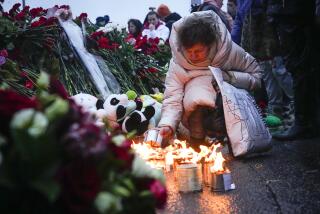Bickering Leaves Muscovites Numb : Reaction: Economics holds more interest than political brawling for Russians trying to make ends meet.
- Share via
MOSCOW — Suppose they had a coup and nobody cared?
While Russia’s two rival governments waged all-out political war Wednesday, Muscovites were strangely subdued and even apathetic about the future of their 2-year-old experiment in democracy.
Most gave tepid approval to Russian President Boris N. Yeltsin’s decision to dissolve the legislature and have a new one elected in December.
“He should have done it long ago,” said Vladimir Barzyonov, 26, a former army political officer turned entrepreneur.
Workaday Russians, already bundled into wool overcoats and head scarves on this autumn day, said they are simply numb from two years of nasty political bickering, mudslinging, alleged and real corruption, coup threats and dire warnings of impending civil war.
After two years of an exhausting struggle to make ends meet when month after month prices jump faster than wages, economics holds more interest to Russians than political brawling that they feel powerless to control.
“The people are tired,” Barzyonov said. “I myself am fed up. I’m tired of the political battle. . . . I want to live a normal life and earn money.”
This attitude favors Yeltsin. Opposition calls for rallies and strikes against a presidential dictatorship have so far been greeted with yawns.
There were no tanks on the streets of Moscow and no noticeable police presence. Many people did not learn that Yeltsin had dissolved the legislature Tuesday night until they arrived at work Wednesday.
About 1,000 Communists and nationalists remained camped out Wednesday around the barricaded White House, Parliament’s headquarters. No Yeltsin forces attempted to dislodge defiant lawmakers who had set up an alternative government inside.
Anti-American sentiment is rare in this new Russia that seems bent on devouring Yankee culture along with its Big Macs. But the anger was palpable once the demonstrators learned that President Clinton had backed Yeltsin in what they see as the establishment of a pro-Western dictatorship.
Yeltsin and his advisers “are in cahoots with plotters from your country,” charged Alexander M. Rossulov. “The first person who spoke in Yeltsin’s defense, only five minutes after he went on the air, was Clinton. Any honest person could understand that they had an agreement. It’s a disgrace (to America), a disgrace.”
However, passersby applauded Yeltsin when the president took a surprise stroll in Pushkin Square with his defense minister Wednesday afternoon.
On stately Leningradsky Prospekt, many people queuing up to buy fresh cakes from the Bolshevik candy factory said they had yet to decide whether Yeltsin’s gambit would help or hurt the country. Workers at the plant, buying fish on their lunch break, were divided on whether conditions at Bolshevik had gotten better or worse since the state-owned concern was privatized in December.
“We don’t really understand all this,” said Marina Vashanova, 34. “It’s all new to us and it’s hard to make sense of it.”
As for the Kremlin and White House bigwigs--called bolshie shishki, or “big bumps,” in Russian--”They are just fighting for power, and they spit on us,” Vashanova said.
Several people said they prefer Vice President Alexander V. Rutskoi as president, but more were disgusted with both Yeltsin and his foes.
“They are all crooks,” said Anatoly Sychov, 46, a technician. “I think almost nobody cares.”
In the cake queue, Yeltsin foes were vastly outnumbered by Russians who said they would stick by him, but both sides complained about his failure to use his victory in a nationwide referendum in April to improve the economy.
“This is a very good step by Yeltsin,” said Tatyana J. Benslavskaya, a 55-year-old aviation engineer. “People lost faith in him because they have been waiting so long. They voted for him in April. September is nearly over and still there are no results.”
Still, Benslavskaya argues, the economy is not as feeble as the president’s critics make it seem. The introduction of private shops and free prices has done away with shortages and long lines. People who can afford to splurge line up at Bolshevik only because its cake is famously good.
“To those people in the White House who say we are all living so badly: Look at this line for cake!” she said.
Two years of post-Communist chaos have done little to alter the Soviet Union’s enforced culture of political passivity. The people are still in the habit of deferring political decisions to the bolshie shishki.
Asked whether he agreed with Yeltsin’s decision to dissolve Parliament, Alexander S. Nesterov, 67, a security guard at Bolshevik, looked stumped.
“That’s the president’s business,” Nesterov said. “They pull us this way or that way, for this leader and that leader. The country should have one leader, and everyone should believe in him!”
More to Read
Sign up for Essential California
The most important California stories and recommendations in your inbox every morning.
You may occasionally receive promotional content from the Los Angeles Times.













